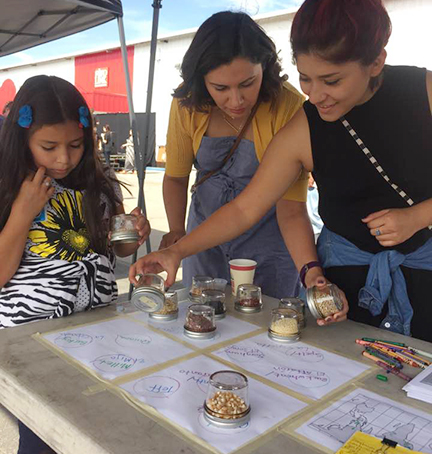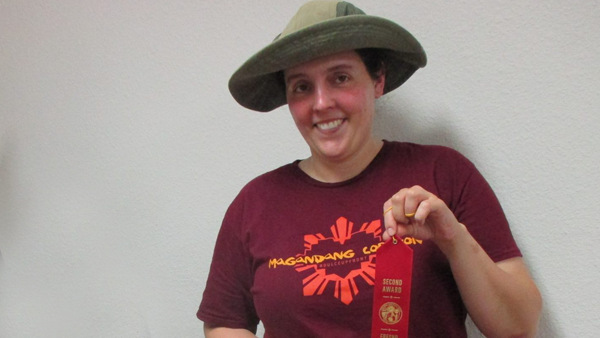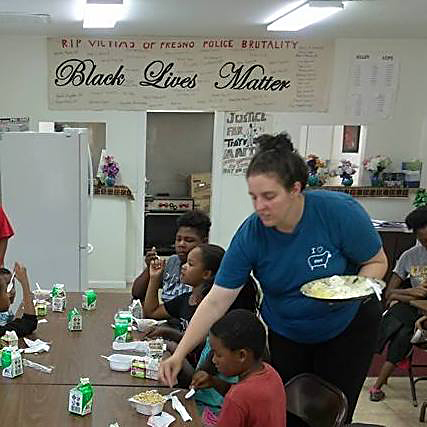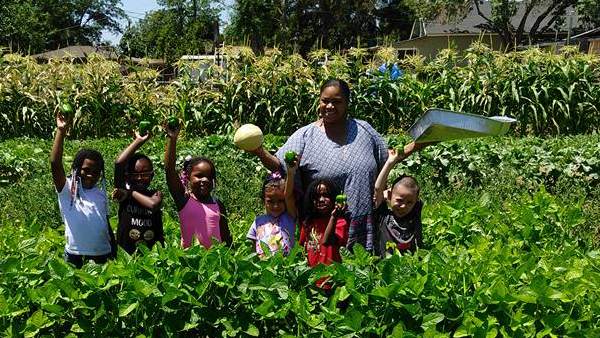|
Sometimes just putting food on the table is the biggest concern for people in cultures impacted by poverty. But Dr. Dvera Saxton is merging anthropology and social justice to tackle inequities at their root.
An assistant professor of anthropology, Dr. Saxton came to Fresno in 2014.
"My training as a cultural anthropologist has been rooted in social justice," she said. "When I arrived in Fresno, I sought friendships and connections with people, organizations, and coalitions who shared these values."
In spring 2018 she will teach her first food and culture course at Fresno State.
"We'll be doing lots of tastings and cooking experiments to complement our discussions and a larger project involving interviewing food entrepreneurs and restaurant owners and workers who come from immigrant, refugee, and diaspora groups," she said. "We'll be producing a food map and story guide to encourage visitors to Fresno during the 2018 Southwestern Anthropological Association Meetings to patronize these businesses."
In her anthropology classrooms, Dr. Saxton has developed an activity called The Grain Game.
"I collect different kinds of edible and global grains, put them in mason jars, and have people see how many they can identify," she said. "It fosters conversations about lost cultural knowledge and bio and crop diversity as well as questions about access."
Dr. Saxton piloted The Grain Game at Food Day at Tulare County Food Link.
"I accompanied it with a tasting of a traditional snack from Mexico called alegría, which means joy, and is made of amaranth, an ancient grain with lots of nutritional and cultural value, but it is only now becoming more popular in upscale markets as a superfood," she said. "This is something people in Mexico ate as a staple for thousands of years! So another aspect of this project is about remembering."

|
|
People trying out the Grain Game during Food Day 2016 at FoodLink in Exeter.
|
Dr. Saxton also volunteers at the Freedom School, which is inspired by the Civil Rights era.
"The many members of the Freedom School have different kinds of knowledge and experiences with respect to food, farming, working with youth, education, and doing grassroots community work," Dr. Saxton said. "For the past three years, the idea of a summer program designed to involve youth in food and farming has been evolving. The idea was to empower kids and also to distigmatize farming in the African American community."
During her first year with Freedom School, she worked with a few teenagers and a large group of African American women to teach canning and baking.
"I actually learned how to can with a group of indigenous Oaxacan farmworkers who had a community garden on the Coast," she said. "With the Freedom School, we used the green tomatoes that the group grew. We made green tomato hot dog relish and canned it and baked a green tomato mock apple pie, which sounds kind of weird, but it is a depression-era recipe for using the resources you have and not wasting food. It's also a better option for diabetics because you can use green tomatoes as a base instead of apples and reduce the sugar content of the pie."
The youth won a blue first place ribbon at the Big Fresno Fair for the relish and a red second place ribbon for the pie. The second year, they did not have land to plant, so they made peach cobblers as a fundraiser.

|
|
Dr. Dvera Saxton holding a Fresno Fair ribbon that the Freedom School youth won for their entries.
|
This year, even more youth participated as Freedom School students, plus more adults volunteered. They planted a garden behind the New Light for New Life Church filled with black eyed peas, sweet corn, tomato, green bell peppers, squash, cucumbers, and eggplants.
"Eggplants are not a familiar food to a lot of the folks in the Freedom School group, so I taught the students about its natural history, what countries it's grown and consumed in, and how to turn it into something more familiar," Dr. Saxton said. "We made personalized eggplant pizzas using grilled eggplant as a base. They learned how to grow and eat more vegetables, and got some cultural and science education at the same time."
Their teacher and the board president of Freedom School, Maria Else, is a graduate student in the Kremen School.

|
|
Dr. Dvera Saxton giving out cheese samples so the youth could decide how to top their eggplant pizzas.
|
In addition to her work at the Freedom School, Dr. Saxton has been a guest facilitator with theExperimental Quesadilla Lab, started by Teresa Gaytan Flores, who works from the idea that food is art and that making food can foster creativity. The Quesadilla Lab helps facilitate conversations about food inequality.
Since arriving to Fresno State, Dr. Saxton has also organized a Food Justice @ Fresno State Speaker and Workshop Series, now in its fourth year.
For future service projects, Dr. Saxton wants to create accessible and inclusive spaces where people can be more creative with food, not only in terms of eating and cooking, but also in terms of solving serious social problems in communities.
"There's only so much we can accomplish within the classroom setting," she said. "I've seen my students and the Freedom School students really grow the most when they're out working with their hands and with their feet on the streets or in the dirt!"
|





